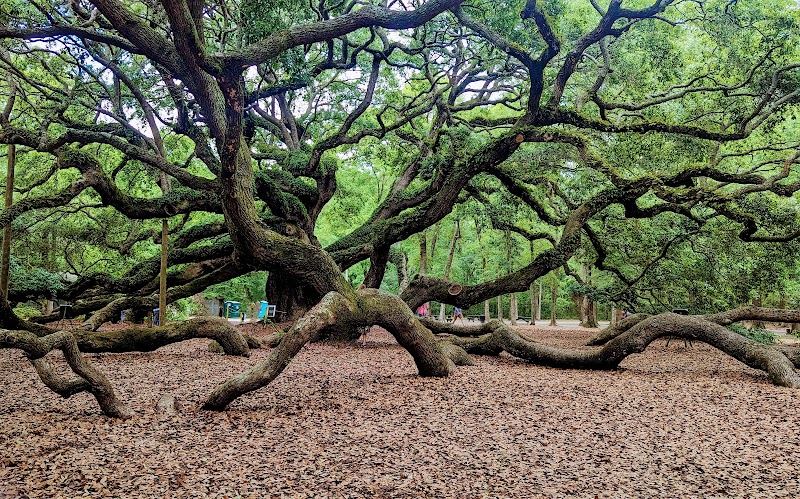
best hiking near Charleston, South Carolina
Discover the best hiking near Charleston, South Carolina—trails that balance gentle terrain with immersive natural coastal experiences. Perfect for beginners and seasoned hikers alike, these paths invite exploration through forests, marshes, and river views just minutes from the city.
Start Early to Beat the Heat
Charleston’s humidity and summer heat can make midday hiking uncomfortable. Plan hikes in early mornings or late afternoons during warmer months for a safer and more enjoyable experience.
Wear Breathable, Moisture-Wicking Clothing
Humidity levels are often high; synthetic fabrics help keep sweat away and reduce chafing during long walks or runs.
Bring Ample Water
Many trails near Charleston have limited water sources, especially in wooded or coastal areas, so carry enough to stay hydrated throughout your hike.
Choose Footwear with Good Traction
Expect trails with sandy soils and occasional muddy spots—shoes designed for trail walking with solid grip help avoid slips.
best hiking near Charleston, South Carolina
Explore the Best Hiking Near Charleston, South Carolina
Charleston is better known for its historic charm and coastal landscapes than mountain hikes, but the surrounding region offers some of the best hiking near Charleston, South Carolina that blend serene woodlands, salt marshes, and coastal trails. From gentle paths that weave through maritime forests to rugged shoreline routes pushing through sea breeze and sand, the hikes around Charleston provide a practical entry into varied Southern outdoor adventure.
The area’s trails aren’t about difficult climbs but invite engagement with nature that’s fiercely itself—whether the live oaks stand as ancient sentinels or the tidal rivers dare you closer with their restless currents. The best hiking near Charleston balances accessibility with the invigorating challenge of diverse terrain: expect flat to rolling topography, sandy soils, occasional mud patches, and stretches along coastal edges where breeze and salt spray create a dynamic environment.
Top picks include the Francis Marion National Forest’s trail systems offering hikes up to 8 miles with mild elevation gains and shaded hardwood corridors. Arthur Ravenel Jr. Bridge Trail is another favorite, where the walk above the Cooper River turns walking into almost a landscape voyage, with the city on one side and marshes on the other.
Practical tips for planning your hikes here include timing trips morning or late afternoon to avoid midday heat and humidity, wearing moisture-wicking clothes, and carrying plenty of water, as parts of the trail network offer little shade. Sturdy, breathable footwear with good traction is essential for next-to-sandy or occasionally slick conditions.
While these trails might not test endurance like mountainous treks, they reward awareness and curiosity—watch the flight of osprey carrying fish against a sky carved in blue, or the tidal creek’s edge where fiddler crabs pop from the mud. These paths are invitations to observe and move alongside nature’s coastal rhythms.
For those looking for more structured adventure or additional activities, our website lists the best adventures in Charleston, South Carolina, to expand your experience beyond the trails: kayaking through salt marshes, historic walking tours, or cycling routes perfect for combining active days with city charm.
The best hiking near Charleston, South Carolina is an accessible, rewarding way to engage with the region’s natural beauty and layered ecosystem. Prepare well, respect the elements, and you’ll meet a trail that moves at the pace of the landscape, patiently revealing its subtle adventures.
Nearby Trips
All Adventures
Boat Charters
Water Activities
Adventures near Charleston, South Carolina
Discover the unique and memorable adventures that make Charleston, South Carolina special.
Frequently Asked Questions
What is the best time of day to hike near Charleston?
Early mornings and late afternoons are best to avoid heat and humidity, particularly in spring and summer months.
Are there any challenging hikes near Charleston?
While the region is mostly flat, some trails in Francis Marion National Forest offer longer distances and varied terrain that provide moderate challenge.
Can I hike with dogs on these trails?
Many trails allow dogs but require leashes. Check specific trail regulations ahead of time, and always carry waste bags.
Are there facilities like restrooms and water stations on the trails?
Facilities are limited on most hiking trails near Charleston. Plan accordingly by bringing water and using amenities in nearby parks or trailheads.
What wildlife might I encounter on these hikes?
Common sightings include white-tailed deer, various bird species like ospreys and herons, and occasional reptiles. Insects are plentiful in warmer months.
Is parking available at trailheads?
Most major trailheads have designated parking areas, though some popular spots can fill up quickly on weekends and holidays.
Recommended Gear
Lightweight Hiking Shoes
Breathable shoes with good traction that handle sandy and muddy paths comfortably.
Hydration Pack or Water Bottles
Essential for maintaining hydration on trails lacking water refill stations.
Insect Repellent
Protects against mosquitoes and ticks, especially during warmer months near marshy areas.
Sun Hat and Sunglasses
Provides protection from strong sun during open coastal stretches and midday hikes.
Local Insights
Hidden Gems
- "The lesser-used connector trails in Francis Marion Forest reveal quiet, dense forest pockets with few hikers."
- "Marsh edges near the Ashley River offer unique birdwatching opportunities away from main paths."
Wildlife
- "Look for bald eagles circling above tidal creeks and the quick darting of fiddler crabs at low tide."
- "Eastern box turtles hide under leaf litter in shaded forest areas."
History
"Many hiking areas follow historic routes once used by Native Americans and early settlers. Along some paths, interpretive markers hint at Charleston’s colonial and Civil War past."
